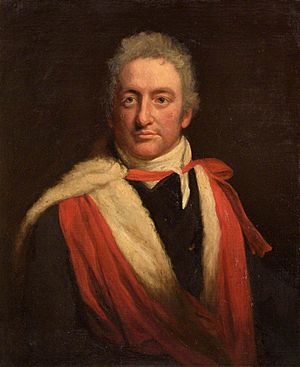Martin Davy facts for kids
Martin Davy (1763–1839) was an important English doctor and a leader at Caius College, Cambridge. He later also became a church leader. He was known for his work in medicine and for guiding one of Cambridge University's famous colleges.

Contents
About Martin Davy
Early Life and Education
Martin Davy was born in 1763 in Ingoldisthorpe, Norfolk, England. His father was a country gentleman. Martin first went to school at Norwich grammar school. After that, he learned about medicine from a surgeon in Great Yarmouth. He then went on to study medicine in Edinburgh. There, he learned about a medical idea called the Brunonian system.
In 1786, Davy joined Caius College, Cambridge. He earned his first medical degree (M.B.) in 1792 and a higher medical degree (M.D.) in 1797. In 1795, he tried to become the Master of Caius College, but he was not chosen that time. For the next two years, he traveled around Italy with Lord Ossulton.
Leading Caius College
In 1803, the previous Master of Caius College, Richard Belward, passed away. Martin Davy was then chosen to become the new Master. Before and after becoming Master, Davy was a very successful doctor.
His Time as Vice-Chancellor
Davy also served as the Vice-Chancellor of Cambridge University twice. This is a very important leadership role. His first time was in 1803–1804. During this time, he made some rules that made it harder for a local doctor, Frederick Thackeray, to get a medical degree. However, people also said that Davy was fair and chose people based on their skills, not their background. He was Vice-Chancellor again in 1827–1828. Davy believed in Whig principles, which meant he supported changes that would give more people opportunities. For example, in 1834, he supported allowing nonconformists (people who were not part of the official Church of England) to get a university education.
Later Life and Achievements
In 1811, Martin Davy became a priest in the church. He was given the title D.D. In 1827, he was given a church job as the rector of Cottenham, Cambridgeshire. In 1832, he also became a prebendary of Chichester, which is another church position.
Davy was recognized for his knowledge and work. In 1801, he was chosen as a Fellow of the Royal Society. This is a very old and respected group for scientists. In 1812, he also became a Fellow of the Society of Antiquaries of London, which is a group for people who study history and old things.
Martin Davy passed away in Cambridge on May 18, 1839. He was buried on May 25 in the antechapel of Caius College. He left his property, Heacham Lodge in Norfolk, to be passed on to future Masters of Caius College.
What He Wrote
In 1809, Martin Davy wrote a short book called Observations upon Mr. Fox's Letter to Mr. Grey. This book was about a small disagreement he had with Charles James Fox, a famous politician.
 | James B. Knighten |
 | Azellia White |
 | Willa Brown |

